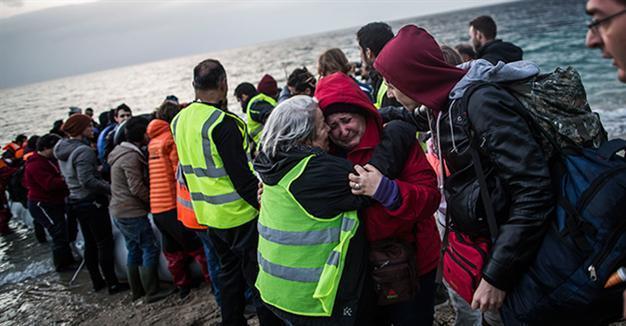4,000 migrants killed in boat journeys on Aegean
Zeynep Bilgehan – ISTANBUL

A volunteer hugs a woman after after refugees and migrants arrive on a beach after crossing a part of the Aegean sea from Turkey to the Greek island of Lesbos on a dingy, Friday, Feb. 19, 2016. AP Photo
Some 4,000 migrants have lost their lives thus far in failed attempts to cross into Europe via the Aegean Sea, a U.N. official has said, underscoring that around 1 million migrants have thus far reached European countries.“Around a million migrants have so far reached Europe. Around 4,000 of them, however, have lost their lives. Some 122,000 people have crossed into Greece from Turkey over the past two months [alone],” said Sabine Freizer from the Europe and Central Asia Regional Office of U.N. Women.
“The number is far beyond that of the same period last year. And for the very first time, the majority of those who have gone on boat journeys have been children and women,” Freizer said.
“A large number of women are subjected to violence in both their home country and on the way,” she said March 7 in Istanbul at a panel on problems Syrian women face.
Freizser said the reason the migrant flow had soared so much was confrontation between Greece and Macedonia over the biggest refugee crisis the 28-nation bloc European Union has faced since World War II.
“New regulations are being implemented in five Balkan states. Refugees have common sense in mind ‘if we can’t go now, we’ll never be able to go at all,’ I think,” she said.
Underscoring that the situation in Syria was making other women around the war-torn country also suffer, Mouna Ghanem of the Peace Initiative for Syrian Women said there had been rights violations in addition to those committed directly during the war.
“As far as we know, there have been rights violations far beyond those committed in war times. However, Syrian women refuse to be victimized, and we see Syrian women employed. They are more active and visible in the media to make their voices heard,” Ghanem added.
















